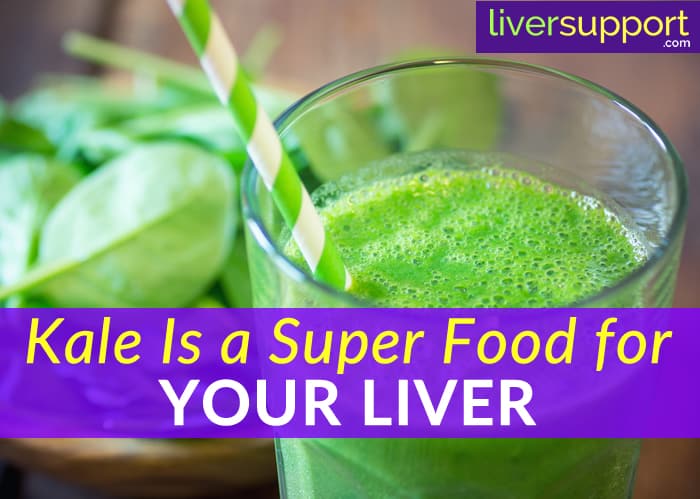
Previous
16 Common and Not-So-Common Signs of Liver Problems

Next
Which Summer Beverages Can Help or Harm Liver Health?
Kale Is a Super Food for Your Liver
Especially if you are managing a chronic liver ailment, there are four irrefutable reasons to put kale on your weekly grocery list.
For the past few years, kale has transitioned from being a decorative adornment on the side of our plates to being a nutrition star in a variety of meals. Hailing from the cabbage family, which also includes broccoli, cauliflower and collard greens, kale is an excellent dietary choice for those with chronic liver concerns.
This heartily textured green may be tough to chew when raw, but kale harbors a long list of health benefits. Because of its veritable superfood powers, kale is now fried or baked into chips, the basis of healthy salads, blended in smoothies and included in sautéed vegetables. Particularly valuable to those with compromised liver function, kale packs a potent kick of valuable phytonutrients.
Why You Should Eat Kale
Below are four reasons someone with liver concerns should consider recruiting kale into their dietary routine:
- Kale Reduces Inflammation – Considered a top anti-inflammatory food, kale helps reduce inflammation in the body. This attribute is extremely valuable to those with a chronic liver problem, because inflammation in the liver begets liver cell damage. One of kale’s phytonutrients is quercetin, a flavonoid that acts as an anti-inflammatory substance in the body. Kale is also a rich source of Vitamin K, a key nutrient for helping regulate the body’s inflammatory process. In addition, a one-cup serving of cooked kale provides about 10 percent of the recommended daily allowance (RDA) of omega-3 fatty acids – substances that also help fight inflammation.
- Kale Has Anti-Cancer Benefits – The phytonutrients found in kale help battle free radical damage which is a contributing factor to cancer risk. Because liver cancer is one of the possible outcomes of advanced liver disease, those with chronic liver problems are urged to consume anti-carcinogenic compounds. The anti-cancer health benefits of kale are a result of several compounds such as indoles including di-indolemethane (DIM) and indole-3-carbinol (I3C) plus isothiocyanates, derived from glucosinolates. According to Chinese researchers who published their findings in a 2009 review in the journal, Nature, the isothiocyanates found in kale were observed to reduce the activation of carcinogens.
- Kale Helps Detoxify the Body – Kale is recognized as providing comprehensive support for the body’s detoxification systems. Since the liver is the primary detox organ, those with chronic liver disease can use all of the additional detoxification help they can get. Research has shown that the isothiocyanates made from kale’s glucosinolates help regulate detox activities in our cells. Most toxins that pose a risk to our body must be detoxified using a two-step process. The isothiocyanates from kale have been shown to favorably modify both detox steps. In addition, the large number of sulfur compounds in kale helps support Phase II detoxification.
- Kale Supports a Healthy Weight – To lose excessive weight, you need to consume fewer calories than you expend. For those with fatty liver disease, losing excessive weight can return their liver to a state of health. Eating foods with low calorie density can help with weight loss because they help you feel full before you have consumed too many calories. Kale is a virtual rock star of low calorie density with only 36 calories in one cooked cup. In addition, each cup of cooked kale contains 2.6 grams of dietary fiber, a nutrient that helps reduce hunger and aids in weight control.
Iron Concerns
Although kale is clearly a super healthy food, it’s high iron content may be disconcerting to some individuals with advanced liver disease. Doctors may request that their patients with above-average iron levels in their body (common with cirrhosis) eat fewer iron-rich foods like red meat and iron-fortified cereal. One cup of cooked kale contains 1.17 mg of non-heme iron, a relatively large amount for a vegetable.
Despite the assumption that kale be included in a doctor’s caution to consume less iron-rich foods, nutrition experts have a differing opinion for this vegetable. This is because in addition to being rich in iron, kale also contains oxalates. Oxalates are compounds derived from oxalic acid and they impair the absorption of non-heme iron. Thus, despite the high quantity of iron in kale, relatively little is actually absorbed due to the kale’s oxalates. Nonetheless, if you have been cautioned against consuming any dietary sources of iron, discuss your concerns with your nutritionist or physician.
The verdict on kale is in, and those with chronic liver issues have every reason to celebrate its superfood status. Between its anti-inflammatory effects, anti-carcinogenic properties, aid for detoxification and weight loss, kale should become your kitchen’s new liver-friendly staple.
http://bembu.com/kale-benefits, 17 Reasons to Eat More Kale, Retrieved July 5, 2015, Bembu.com, 2015.
https://newyorkbuyersclub.org/home/resources/recommended-reading-files/19-LIVER_DYSFUNCTION.pdf, Liver Dysfunction, Retrieved July 5, 2015, New York Buyer’s Club, Inc., 2015.
http://www.hepatitis.va.gov/patient/daily/diet/single-page.asp, Viral Hepatitis – Diet and Nutrition: Entire Lesson, Retrieved July 2015, US Department of Veteran Affairs, 2015.
http://www.irondisorders.org/diet/, Achieving Iron Balance with Diet, Retrieved July 5, 2015, Iron Disorders Institute, 2015.
http://www.liver.ca/liver-disease/having-liver-disease/healthy-living-guidelines/nutrition.aspx, Nutrition and Liver Disease, Retrieved July 5, 2015, Canadian Liver Foundation, 2015.
http://www.livestrong.com/article/293178-is-kale-good-for-weight-loss/, Is Kale Good for Weight Loss?, Natalie Stein, Retrieved July 5, 2015, Demand Media, Inc., 2015.
http://www.medicaldaily.com/6-kale-health-benefits-will-help-you-live-longer-and-live-well-276566, 6 Kale Health Benefits That Will Help You Live Longer And Live Well, Lizette Borreli, Retrieved July 5 2015, MedicalDaily, 2015.
http://www.naturalhealth365.com/health-benefits-of-kale-anticancer-1179.html, The anticancer health benefits of kale, Christine M. Dionese, LAc, MSTOM, Retrieved July 5, 2015, Natural Health 365, 2015.
http://www.ncbi.nlm.nih.gov/pubmed/17376040, Restriction of dietary calories, fat and iron improves non-alcoholic fatty liver disease, Yamamoto M, et al, Retrieved July 5, 2015, Journal of Gastroenterology and Hepatology, April 2007.
http://www.whfoods.com/genpage.php?tname=foodspice&dbid=38, Kale, Retrieved July 5, 2015, The George Mateljan Foundation, 2015.







Is kale still a powerhouse if cooked?
yes. eat it any way you like or can.